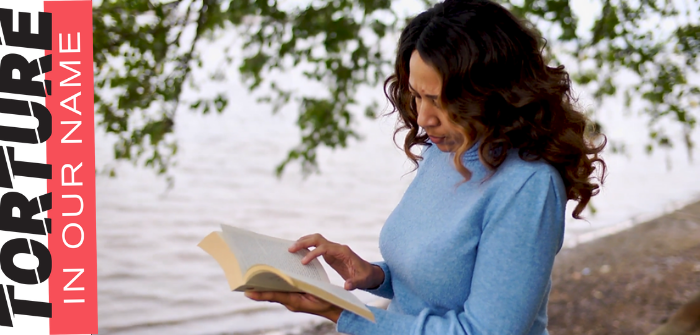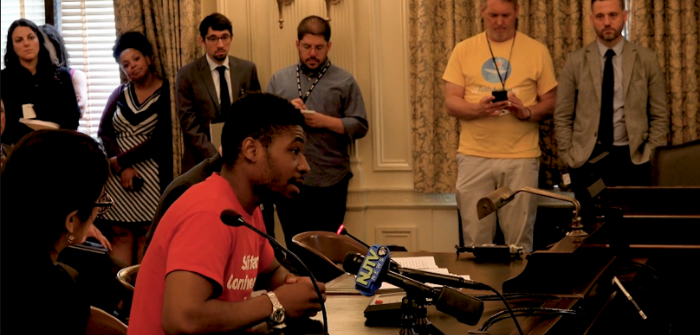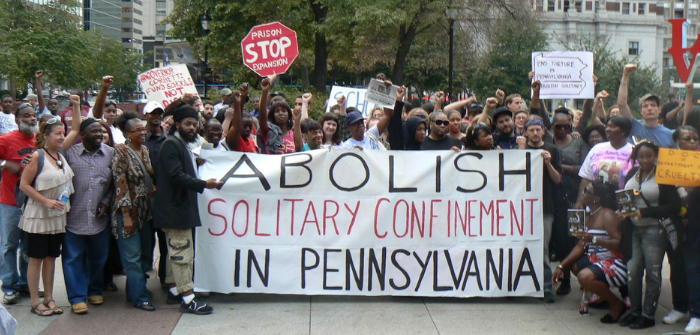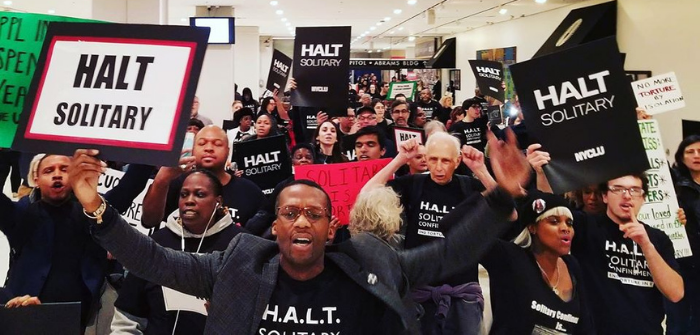Cases
- Hutto v. Finney, Supreme Court of the United States, 437 U.S. 678 (1978). Litigation challenged the conditions in the Arkansas prison system. The Court held that isolation for longer than thirty days in Arkansas prisons constituted cruel and unusual punishment and violated the Constitution.
- In re Medley, 134 U.S. 160 (1890). Case fpund Colorado statute specifying solitary confinement prior to execution unconstitutional under ex post facto prohibition.
- Westefer v. Snyder, District Court, S.D. Illinois, 725 F. Supp. 2d 735 (2010). The case was brought by prisons in the Tamms Correctional Center in Illinois, who stated the harsh conditions violated their rights and sought alternatives to solitary confinement.
- "Edmund LaChance v. Commissioner of Correction, et al." Amicus Brief, ACLU, March 29, 2012. The ruling reaffirmed that legal protections must be in place to balance solitary confinement as a harsh punishment. The state Department of Corrections (DOC) was ordered to put regulations into place for unlawful solitary, solitary without due process for over 90 days. Additionally, the DOC can no longer use terms such as administrative segregation to get around legal protections.
- Incumaa v. Stirling (2015)
- Ashker v. Governor of California The Center for Constitutional Rights, (2019). The case charges that prolonged solitary confinement violates the Eighth Amendment’s prohibition against cruel and unusual punishment, and that the absence of meaningful review for SHU placement violates the prisoners’ rights to due process
International Law Resources:
- "Supermax Confinement in U.S. Prisons" by The Committee on International Human Rights, The Association of the Bar of the City of New York, September 2011
- "Torture and other cruel, inhuman or degrading treatment or punishment" by Juan E. Mendez, United Nations General Assembly, August 5, 2011. Mendez is the Special Rapporteur of the Human Rights Council on torture and other cruel, inhuman or degrading treatment or punishment. This interim report draws attention to solitary confinement and how it causes mental and physical suffering. The report gives guidelines for States to adopt in order to minimize its use, and hopefully abolish solitary confinement.
Law Journals:
- "Prolonged Solitary Confinement and the Constitution" by Jules Lobel, Pitt Law, July 2009.
- "Mental Torture: A Critique of Erasures in U.S. Law" by David Luban and Henry Shue, Georgetown Law, 2011.
- "Recap of PLAP Solitary Confinement Panel" by Jacob Alderdice, Harvard Civil Rights – Civil Liberties Law, February 2013.
- "Courts Cite Volume 125 Forum Essay on Solitary Confinement" by Tracy Nelson, The Yale Law Journal, October 2017.
- "Cruel, Unusual, and Unconstitutional: An Originalist Argument for Ending Solitary Confinement" by Merin Cherian, Georgetown Law: American Criminal Law Review, Spring 2019.
Press Coverage of Lawsuits:
- "Filing: Conditions in Ohio juvenile detention facilities remain unconstitutional" by Pamela Engel and Alan Johnson, The Columbus Dispatch, October 30, 2012. A new filing in an ongoing 2004 federal class-action lawsuit states that the conditions in juvenile detention facilities remain unconstitutional. The suit states that adolescents are confined for 24 hours without access to things like education or recreation.
- "Colorado prison inmate wins right to outdoor exercise" by John Ingold, The Denver Post, September 4, 2012. In a ruling last week, a federal judge ordered prison officials to allow Troy Anderson to exercise outside. Anderson has been in solitary confinement for more than 10 years.
- "After Years in Solitary, a Mentally Ill Prisoner's Day in Court" by Jean Casella and James Ridgeway, Mother Jones, April 30, 2012. Troy Anderson spends most of his time at the Colorado State Penitentiary (CSP) in isolation. Anderson is mentally ill and doesn't receive proper care. Anderson's lawyers argue, starting April 30, before the District Court in Denver that his situation violates his civil rights and is a violation of the Americans with Disabilities Act.








